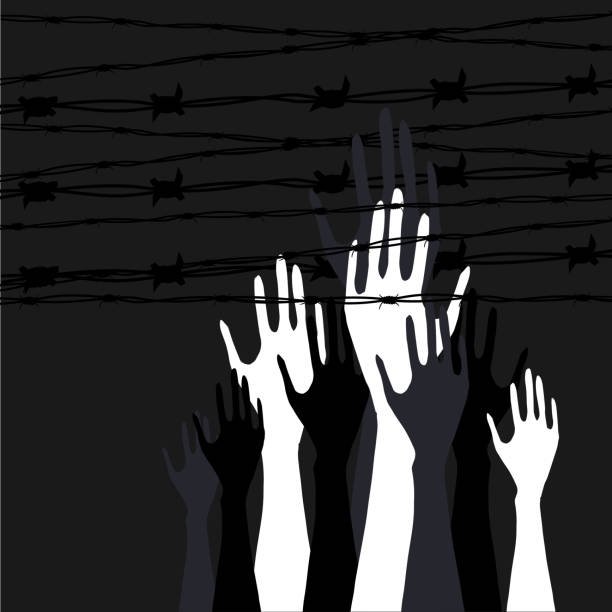
Holocaust
Denial
Why It’s Important to Confront Holocaust Denial
The Nazi persecution of the Jews began with hateful words, escalated to discrimination and dehumanization, and culminated in genocide. The consequences for Jews were horrific, but suffering and death was not limited to them. Millions of others were victimized, displaced, forced into slave labor, and murdered. The Holocaust shows that when one group is targeted, all people are vulnerable.
The denial or distortion of history is an assault on truth and understanding. Comprehension and memory of the past are crucial to how we understand ourselves, our society, and our goals for the future. Intentionally denying or distorting the historical record threatens communal understanding of how to safeguard democracy and individual rights
This three-minute video explains Holocaust denial and the different forms it takes.
Forms of Denial
The denial of the Holocaust and genocide take many forms, from simply ignoring obvious facts by manipulating the sources, through minimizing the dimensions of genocide, to trivializing and rationalizing genocide by analogy and claiming that it is an acceptable example of the kinds of things that happen in wartime.
The deniers of the Holocaust and genocide attack three facts in particular:
the existence of the gas chambers
the capacity of the crematoria in the camps, which far exceeded the natural death rate
the enormous scale of the crime.
According to Professor Yisrael Gutman of the Yad Vashem Memorial Institute in Israel, the use of the term “Polish concentration camps” is a form of Holocaust denial. It is a conscious or unconscious way of changing victims into perpetrators and an attempt to blur the question of responsibility for the crime.
The aim of denying the existence of the gas chambers is, first, to negate the mass scale of the crime of genocide. The second aim is to make it easier to contend that people have always been killed on a greater or lesser scale throughout history, and that the things that the Nazis did during the Second World War were hardly exceptional, but rather examples of the kind of repression that always occurs during war.
The prime evidence for the deniers’ contention that there were no gas chambers in Auschwitz used to be an account by one of the Auschwitz guards, Sonderführer Thies Christophersen (transcribed in the presence of attorney Manfred Röder). Published in the form of a brochure titled Auschwitz Lüge (Auschwitz Is a Lie) in 1973, Christophersen’s assertions became a “classic” of neo-Nazi propaganda. The SS man stated categorically that, as an eyewitness in Auschwitz, he never saw any gas chambers there. Christophersen also claimed that reports of cruelty in the camp were a lie, and that those who opposed Hitler during the war were traitors. Auschwitz, he asserted, was no death camp, but instead an ordinary industrial plant where “internees” were treated according to the regulations, and gas chambers the product of diseased imagination.
Since the end of the 1980s, genocide deniers have been appealing to more “objective” proofs, namely the results of chemical analysis of plaster samples taken from the walls of the gas chambers. Teams of pseudo-experts posing as tourists clandestinely gouge chunks of plaster from the walls of the gas chambers and later submit them to chemical analysis for the presence of hydrogen cyanide compounds. The quantity of these compounds is always, of course, too small to state that people were killed in the gas chambers. What is more, the deniers regard these analyses as clear proof that no one was killed by gas there.
David Irving
Probably the most famous person to deny the Holocaust is David John Cawdell Irving (born 24 March 1938) is an English author. In Austria, he served a prison sentence in 2006 for Holocaust denial. Earlier, an English court found him guilty of Holocaust denial, an anti-Semite and racist, and associated with right-wing extremists promoting neo-Nazism. The Austrian court also found that he was guilty of falsifying history and that he is anything but a decent historian.
Court case in Austria
Irving was arrested in Austria on November 11, 2005, and sentenced to three years in prison on February 20, 2006. He could have been given ten years. According to the court in Vienna, he was guilty of denying the Holocaust. During the trial, he declared for the first time that his vision had changed, and that the Holocaust must have really existed. He said that he had studied new research material, which would show that the gas chambers really existed, but that they had mainly been used in the so-called "Heydrich" camps. Here millions of Jews would have been murdered mainly for financial reasons. He later stated that he should have been found guilty, but that he only published what he found in archives and that this should not be prohibited. He appealed the ruling. The appeals court ruled on December 20, 2006, commuting two-thirds of the sentence to suspended imprisonment, so that Irving was released early after thirteen months. He returned to the United Kingdom on 21 December 2006.
David Irving
Watch the Holocaust Denial movie trailer about David Irving
Denial Official Trailer
